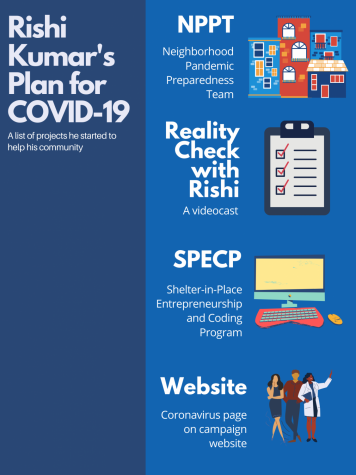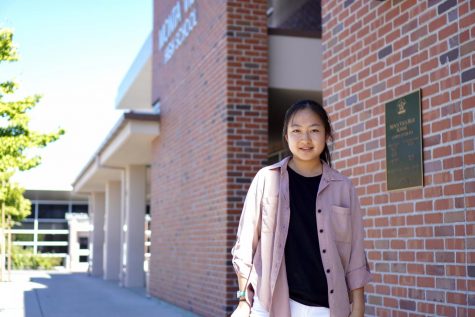MVHS students help council member Rishi Kumar adapt to COVID-19 while he runs for Congress
How political campaigns have changed in the pandemic era
June 19, 2020
Sophomores Ellie Hsu and Jannah Sheriff are both current interns for Saratoga City Council member Rishi Kumar, who is running for the 18th Congressional District of California. Kumar describes himself as a high-tech software executive, mechanical engineer and community activist who strives to help working-class families in Silicon Valley.
After COVID-19 spread to the U.S., Kumar created additional plans and shifted his priorities from campaigning to helping his community adapt to a new normal. He has implemented multiple programs including a National Pandemic Preparedness Program, a program integrated into the Community Emergency Response Team (CERT) that provides the steps to help individuals stay alert and prepared for potential pandemics, and the Neighborhood Pandemic Preparedness Team (NPPT), a program that allows neighbors to help each other out during emergencies.
Additionally, Kumar believes that the pandemic has revealed important issues that Congress needs to address, including racism, climate change, neighborhood safety, healthcare, economic disparities, education, traffic and housing.
“The right political leadership — untethered to special interest groups — can be the difference between life and death for tens of thousands of people,” Kumar said in an email. “Innovative, fresh thinking will be necessary to solve the issues caused and exposed by COVID-19, and I intend to put my experience and technological know-how to work for the U.S. and Silicon Valley.”

As interns for Kumar’s campaign, Sheriff and Hsu initially worked on calling residents to vote for the elections. However, after shelter-in-place started, their work shifted from calling voters through a phone to starting new projects that contribute to the community.
“Now that COVID-19 has [spread to] the community, we scrapped the original focus for now and transition[ed] to just calling people to see if they need any help or service during these times and also focus [on] helping the community,” Sheriff said. “You could say the campaigning side of it has halted, and it’s more community service at this point.”
According to Hsu, Kumar always prioritizes helping the people in his community. Since Kumar does not accept donations from big corporations, Hsu believes that he tries to represent the voices of the people rather than a select few.
During Sheriff’s and Hsu’s internships with Kumar, they have learned valuable lessons about politics and voting. For Hsu, learning to accept the fact that no solution can satisfy every voter in the U.S. has helped her understand the reality of policies, bills and elections and become a more responsible and mature individual.
“[I] see the difficulty of [appealing] to different people and it also [makes] me more exposed to the sad truth [that] you can’t make everyone happy, and sadly just about every plan you make to help people will also hurt other people,” Hsu said. “[These lessons] definitely force you to be more responsible and to take initiative. This internship is not a set path for you to take it. You decide what you want to do. And so it forced both of us to take on more responsibility for [ourselves]; it’s a little bit scary.”
Agreeing with Hsu, Sheriff adds that politics is a subject that can both frustrate and interest her. She has learned that although not all the policies she advocates for will be implemented, it is still crucial to participate in the field.
“[Politics is] a really frustrating [subject] to be interested in because there’s always going to be something [or someone] that drags you down or there’s always going to be something that isn’t going [your] way,” Sheriff said. “But it’s also an essential [subject] because it controls parts of our lives. This internship made me realize that further, but it also made me more logical. You realize it’s a lot of hard work that’s not very glamorous but still essential.”
Sheriff and Hsu are both part of the graphics design team. In order to promote Kumar on social media, they create ideas for flyers that can be posted online. These designs are used to promote webinars and online events that Kumar hosts.
In addition to designing graphics for Kumar’s social media platforms, Sheriff and Hsu have also helped arrange weekly online public meetings about health, education and stimulus packages.
“[We] are trying to reach out to different audiences like teens and kids [for] coding seminars,” Hsu said. “The graphics are [used] to try to get people to know what events he’s holding. We’re making general campaign graphics [that show] you his mission, his goals [and] his ideal ideology.”
According to Kumar, many of his interns were crucial to the current success of his campaign by running virtual “pandemic war rooms,” a program that allows interns to immediately respond to the community members’ requests for help, ones that may include delivery, resources and questions.
As November 3, the day of the elections, approaches, Kumar is hoping to address several concerns regarding COVID-19. For example, he believes that there is a misallocation of funds in the March 27 CARES Act, a program that provides economic assistance to those in need. Additionally, Kumar wants to solve issues within the healthcare system in order to better prepare his community for a possible future pandemic.
“I find it absurd that although America is the most prosperous nation in the world, basic healthcare services aren’t guaranteed to everyone,” Kumar said in an email. “I’ve supported Medicare for All, and I think COVID-19 only highlights the critical reasons for why healthcare must be a fundamental human right. Universal healthcare exists in other nations. There is no reason why we can’t make it work here in America.”
Although the pandemic has caused businesses to slow down, stores to close, court trials to be suspended and overall national delays, Kumar believes that this is the optimal time to invest in technology to improve the way COVID-19 tests are distributed and the ways patients are treated in hospitals.
“We must never again be caught short of virus tests, or basics such as cotton swabs and common reagents,” Kumar said in an email. “This is also the time to invest in infrastructure, education, manufacturing, including technology… This is the time to make bold moves and strengthen America’s position in the global economy, providing greater opportunities for every American.”

















